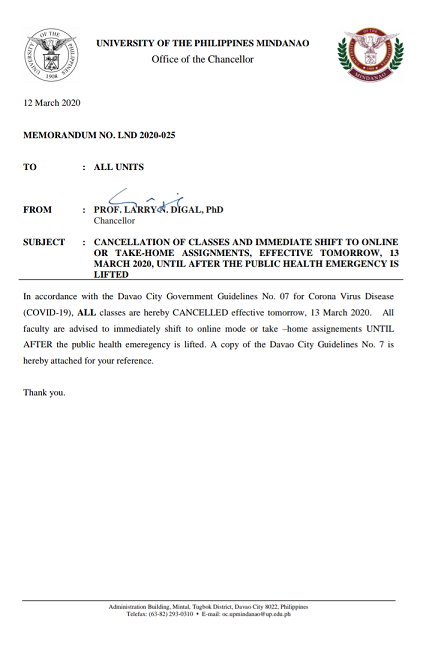Call for volunteers for a CoViD-19 testing lab
The Philippine Genome Center-Mindanao has issued a call for volunteers who are willing to work in a CoViD-19 diagnostic laboratory in Davao del Norte. Persons who wish to participate need to have experience in RNA/PCR/qPCR and are willing to work in Davao del Norte. Qualified persons may indicate their interest by filling up the survey form at http://tiny.cc/vn7tlz. Deadline is 26 March 2020.
This call is URGENT. Davao Region has not reached its CoViD-19 peak, hence the operationalization of the lab is urgent to prevent the spread of CoViD-19 in the region.
UPDATE:
“Our partners from the private sector will take charge of designing the lab to ensure it will meet biosafety standards,” she said. “The entire laboratory establishment including accreditation, design and assembly, up to equipment installation and calibration, will take roughly 7 to 8 weeks. When running at full capacity, the lab can be expected to handle 96 tests per day.”
Based on previous discussion with the Department of Health (DOH), the proposed lab will likely be attached to the Davao Region Medical Center (DRMC) in Tagum City according to UP Mindanao chancellor Dr. Larry Digal.
“DOH XI welcomed the idea of setting the lab with DRMC to supplement the capacity of SPMC so that other provinces in the Davao Region and even outside the region can be better served,” he said. “We are now working closely with the DavNor LGU on how to set up this lab as soon as possible. But just like the case of Marikina, the facility will have to be assessed by the Research Institute for Tropical Medicine [RITM] of the DOH before it can be operational.”
Southern Philippines Medical Center (SPMC) Dr. Leopoldo Vega has suggested during the Philippine Information Agency online press conference yesterday for UP Mindanao “to be an independent lab” since it will take time for DOH System and UP System to sign a memorandum of agreement.
He said, “Just make sure you have the necessary accreditation. This is a molecular biology lab. There has to be a standard, protective room with negative pressure so that safety is there when they inactivate the virus. If they have that, I think the RITM would give their approval.”
To augment the personnel who will initially operate the proposed lab, PGC Mindanao has already issued a call for volunteers last March 24. Dr. Murao said, “We cannot rely fully on our partner hospital to free up their personnel to do COVID-19 tests because they are needed in other hospital operations. We need volunteers with background on molecular biology, which is crucial to process the samples.”
Volunteers must have experience on quantitative polymerase chain reaction (qPCR) or ribonucleic acid procedures and are willing to be deployed in Davao del Norte. The survey form is available here: http://tiny.cc/vn7tlz
“While we already included in our initial proposal to the LGU funding to take care of our volunteers (i.e., compensation, accommodations, etc.), we are now crafting a separate proposal for a rigorous training on biosafety and molecular diagnostics to ensure the welfare of our volunteers. This will be submitted to the UP System for funding,” she added.
Read original news story here: https://www2.upmin.edu.ph/index.php/news-sp-3476/madayaw-news/4236-proposed-diagnostics-program-for-free-covid-19-testing

 12 March 2020
12 March 2020